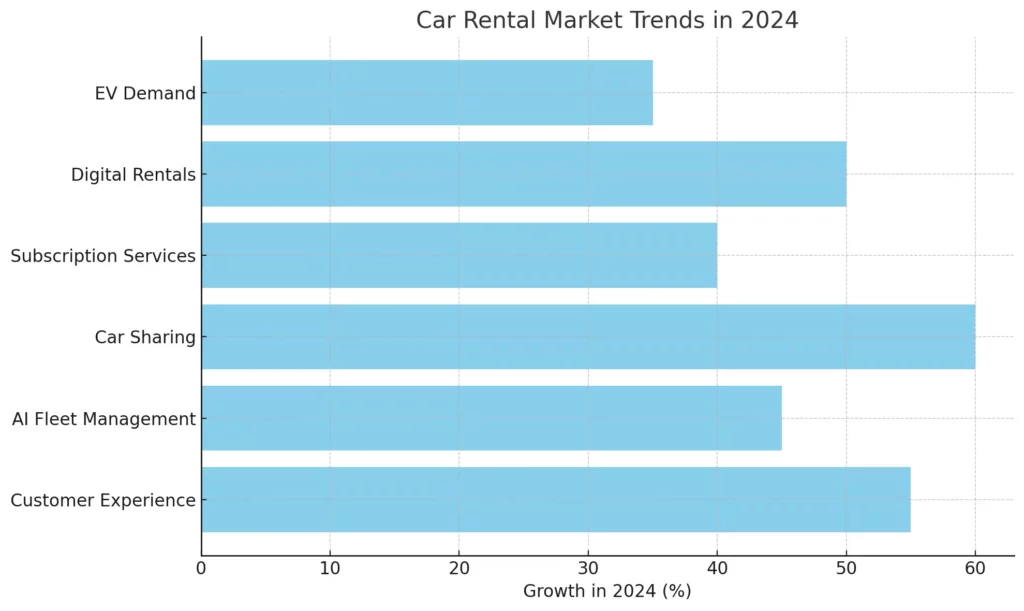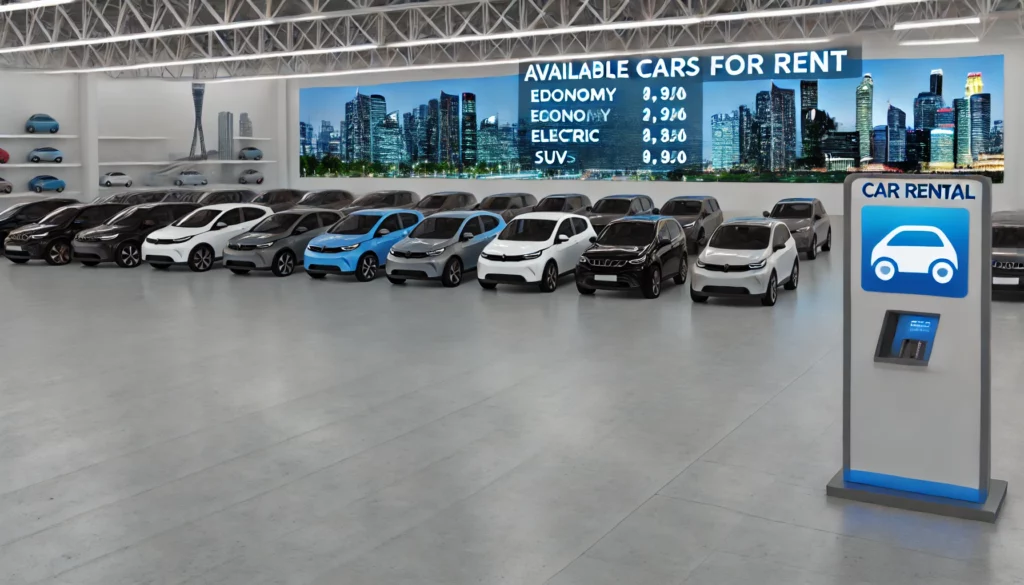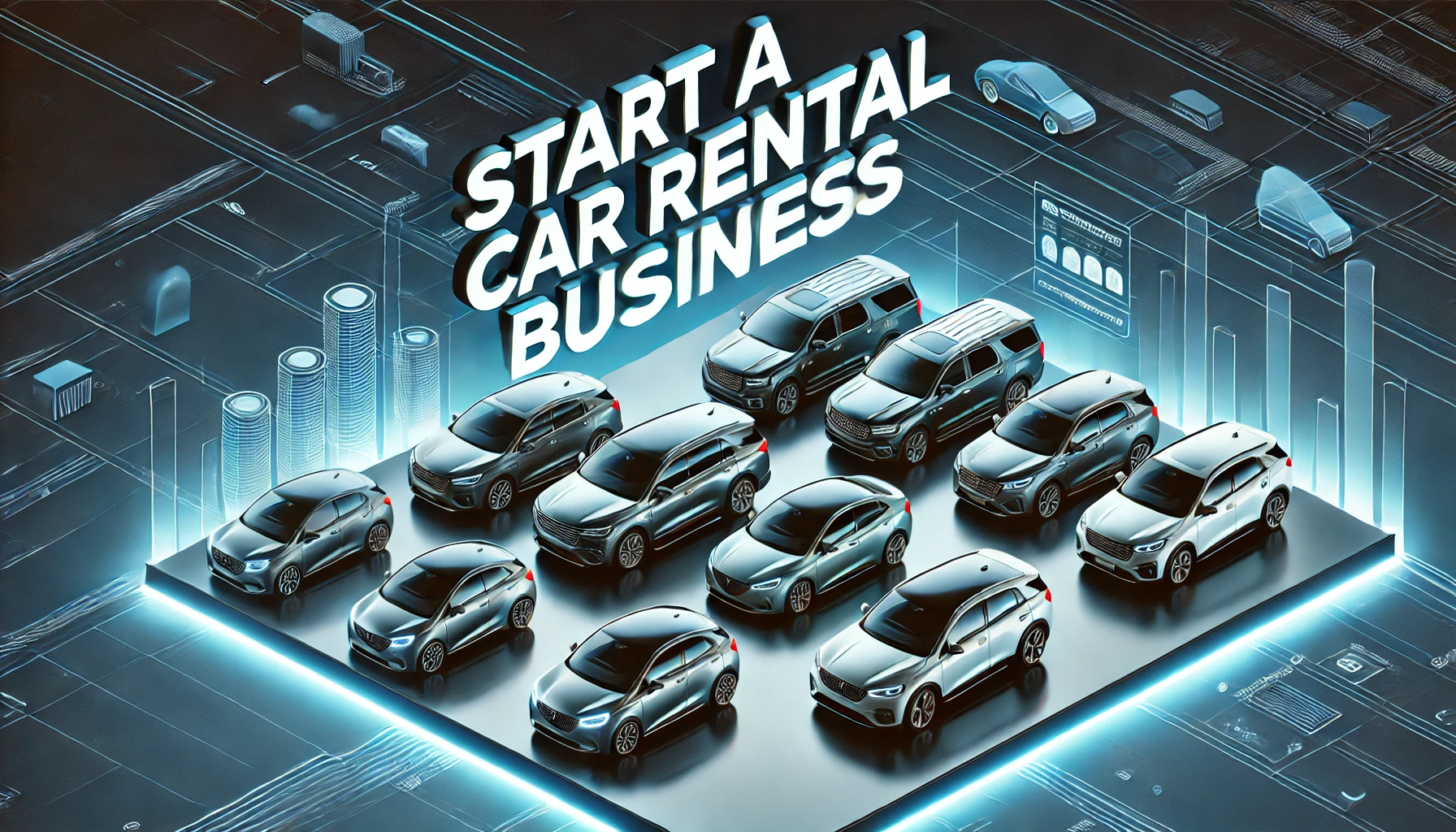The car rental industry continues to thrive as consumers increasingly seek flexible transportation solutions. Whether you’re an entrepreneur looking to tap into a lucrative market or a business owner wanting to diversify, starting a car rental business in 2024 could be your gateway to success. In this ultimate guide, we’ll walk you through everything you need to know—from planning to launching a profitable Uber clone.
Why Start a Car Rental Business ?
The global shift toward shared mobility and the rising demand for short-term car leasing have led to exponential growth in the car rental market. With more consumers choosing temporary vehicle solutions over ownership, this sector is projected to expand even further. Additionally, emerging 2024 car rental trends such as electric vehicles (EVs) and digital booking platforms have made this industry more appealing than ever.
Market Trends for the Car Rental Business
| Market Trend | Impact on Car Rental Business |
|---|---|
| Increased Demand for EVs | Growing interest in eco-friendly vehicles |
| Digital and Contactless Rentals | Customers prefer seamless, app-based bookings |
| Subscription-Based Car Rentals | New model allowing flexible long-term use |
| Rise of Car Sharing | Shared vehicle models targeting urban dwellers |
| AI-Powered Fleet Management | Efficiency through automation and predictive analytics |
| Customer Experience Focus | Emphasis on personalization and customer satisfaction |
The car rental industry is rapidly evolving, driven by changing consumer behaviors, technological advancements, and environmental concerns. Here are the top 2024 market trends that are shaping the car rental industry:
1. Increased Demand for Electric Vehicles (EVs)
The global push toward sustainability has led to a growing demand for electric and hybrid vehicles in the car rental market. Consumers are becoming more eco-conscious and are looking for rental options that align with their values.
2. Digital and Contactless Rentals
Post-pandemic, consumers now expect seamless and contactless rental experiences. In 2024, mobile apps, digital keys, and online booking platforms are no longer a luxury but a necessity. Rental companies are embracing technologies like facial recognition, contactless payments, and app-based vehicle access.
3. Subscription-Based Car Rentals
Subscription services, which allow customers to swap cars or upgrade based on their needs, are becoming more popular. This model offers flexibility and is ideal for customers who need a car for an extended period without long-term commitment.
4. Rise of Car Sharing
Car sharing is another significant trend in 2024. Consumers, especially in urban areas, prefer renting vehicles for short-term use, making car sharing a competitive segment. It offers convenience and affordability compared to traditional rentals.
5. AI-Powered Fleet Management
Fleet management is becoming more efficient with AI and IoT technologies. Car rental companies are using these tools to track vehicle performance, optimize routes, and predict maintenance needs, improving overall efficiency and reducing downtime.
6. Focus on Customer Experience
With increased competition, car rental businesses are focusing heavily on providing exceptional customer experiences. Personalization, loyalty programs, and mobile-first interactions are becoming the norm, enhancing customer satisfaction and retention.
Here’s a visual representation of these market trends:
Car Rental Market Trends
The major trends shaping the car rental industry in 2024, focusing on EV demand, digital services, subscription models, car sharing, AI management, and customer experience improvements. According to recent car rental industry statistics, the demand for electric vehicles and digital-first rental solutions continues to rise globally.

Different Types of Car Rental Businesses
The car rental industry is diverse, with several business models that cater to different customer needs. Depending on the market you want to target, you can choose a model that aligns with your business goals. Here are the major types of car rental businesses:
1. Traditional Car Rental Business
- Overview: This is the most common model, where customers rent vehicles for short periods, typically ranging from a few hours to several days or weeks.
- Target Audience: Tourists, business travelers, or local residents in need of temporary transportation.
- Business Model: The rental fee is based on the duration of use and the type of vehicle. This model typically involves a wide range of vehicles from economy cars to luxury SUVs.
- Example: Hertz, Enterprise.
2. Peer-to-Peer Car Rental (Car Sharing)
- Overview: In this model, individuals can rent out their personal vehicles to others. It’s a platform-based model where the company acts as a mediator, managing bookings, insurance, and payments.
- Target Audience: Urban dwellers, eco-conscious individuals, or those looking for cost-effective, short-term rentals.
- Business Model: The platform takes a commission from each booking. Car owners earn a portion of the rental fee.
- Example: Turo, Getaround.
3. Luxury and Exotic Car Rentals
- Overview: This model caters to customers looking to rent high-end luxury or exotic vehicles such as Ferraris, Lamborghinis, or Rolls-Royces.
- Target Audience: Wealthy individuals, tourists, or people attending special events like weddings or corporate functions.
- Business Model: Rentals are priced higher due to the premium nature of the vehicles, and the business can also offer added services like chauffeurs or concierge options.
- Example: Beverly Hills Rent-a-Car, Prestige Car Hire.
4. Corporate or Long-Term Rentals
- Overview: This model provides vehicles for longer rental periods, often to corporate clients or individuals needing a car for extended periods (weeks to months).
- Target Audience: Corporate clients, professionals on long-term projects, or individuals who need a vehicle without the long-term commitment of buying.
- Business Model: Offering vehicles at lower daily rates in exchange for longer rental durations. Businesses may also offer fleet management services for corporate clients.
- Example: Avis Business Solutions, National Car Rental.
5. Subscription-Based Car Rentals
- Overview: A newer business model, subscription car rentals allow customers to pay a monthly fee to access a fleet of vehicles. They can swap vehicles depending on their needs, offering flexibility without the hassles of ownership.
- Target Audience: Consumers who need a variety of vehicles for different occasions, frequent travelers, or individuals who don’t want the financial commitment of owning a car.
- Business Model: Monthly or annual subscription fees based on the type of vehicles available and usage terms. Maintenance, insurance, and repairs are usually included.
- Example: Flexdrive, Fair.
6. Airport Car Rentals
- Overview: Focused on travelers, these rentals are located at or near airports, providing convenient services for people flying in or out of the city.
- Target Audience: Business travelers, tourists, and frequent flyers.
- Business Model: Revenue is generated through short-term rentals with premium pricing due to the convenient airport locations. Many companies partner with airlines and travel booking platforms.
- Example: Alamo, Budget.
7. Electric Vehicle (EV) Rental
- Overview: With the increasing demand for eco-friendly transportation, EV rental businesses focus on providing a fleet of electric or hybrid vehicles.
- Target Audience: Environmentally conscious individuals, tech-savvy customers, and organizations committed to sustainability.
- Business Model: EV rentals often include charging options and partnerships with charging station networks. The business may also offer special rates for long-term rentals or subscription services.
- Example: Green Motion, Hertz EV.
8. Chauffeur-Driven Car Rentals
- Overview: This model offers luxury cars with professional drivers, focusing on high-end clients who require premium service, convenience, and comfort.
- Target Audience: VIP clients, corporate executives, event organizers, and tourists seeking an all-inclusive transport solution.
- Business Model: Premium pricing for chauffeur-driven services, including additional options like airport pickups, event transportation, or city tours.
- Example: Blacklane, Uber Black (for high-end chauffeured rides).
9. Specialty Car Rentals
- Overview: This niche market focuses on providing specialized vehicles such as vintage cars, sports cars, or even RVs and camper vans for enthusiasts or specific occasions.
- Target Audience: Car enthusiasts, individuals seeking unique travel experiences, or people attending special events.
- Business Model: Higher rental fees due to the specialty nature of the vehicles, with additional services like event-specific rentals, such as weddings or movie productions.
- Example: RoadBear RV, Classic Car Rental.
10. Ride-Sharing Fleet Rentals
- Overview: Ride-hailing drivers (Uber, Lyft) often rent cars from companies that specialize in providing vehicles for this purpose. This allows drivers without their own cars to work in the gig economy.
- Target Audience: Ride-hailing drivers, gig workers, or those looking to enter the gig economy without owning a vehicle.
- Business Model: Rental fees are structured around the driver’s earnings, often with daily, weekly, or monthly options. The company may also provide vehicle maintenance and insurance.
- Example: Hertz with Uber, Lyft Express Drive.

Each type of car rental business caters to different market needs and demands. Whether you’re looking to start a traditional rental service or venture into new trends like EV rentals or car sharing, understanding your audience and business model is key to success.
Steps to Launch a Car Rental Business
1. Conduct Market Research
Before you dive in, it’s essential to understand the local market and competition. Identify the needs of potential customers—are they tourists, business professionals, or local residents? This will help you decide on your fleet size and types of vehicles. Explore these key areas:
- Target audience: Define your customer base.
- Local competition: Research other car rental services in your area.
- 2024 car rental trends: Keep an eye on the shift towards electric and hybrid vehicles.
2. Choose Your Business Model
The car rental industry offers several business models. It’s crucial to choose the one that aligns with your goals, capital, and market demand.
- Traditional Car Rental: Offer a range of vehicles for short-term leases.
- Car Sharing: Create a fleet of vehicles available for shared use, which appeals to eco-conscious consumers.
- Luxury/Exotic Car Rentals: Cater to a high-end market seeking luxury and specialty vehicles.
- Car Rental Franchise: Consider partnering with an established brand, offering the advantage of a proven business model and brand recognition.
3. Draft a Business Plan
A well-structured business plan is the backbone of any successful car rental startup. It should cover the following aspects:
- Mission and Vision: Define the long-term goals of your business.
- Fleet Strategy: Outline the types of vehicles you’ll offer (economy, luxury, SUVs, etc.) and their acquisition strategy (leasing, buying, etc.).
- Revenue Model: Determine pricing, rental durations, and any additional services such as insurance or roadside assistance.
- Marketing Plan: Specify how you’ll attract customers through digital marketing, partnerships, and word of mouth.
- Operational Strategy: Plan for customer service, fleet management, and software integration for bookings.
4. Secure Financing
Starting a vehicle leasing business can require a significant amount of capital. You’ll need to secure financing to cover fleet acquisition, insurance, software, and staffing costs. Options include:
- Bank loans: A traditional loan can fund vehicle purchases.
- Leasing: Leasing your fleet can reduce upfront costs.
- Investors: Seek investors interested in the auto rental service sector.
5. Obtain Necessary Permits and Insurance
Compliance with legal and safety regulations is crucial. Ensure that you have the necessary business licenses, vehicle registration, and commercial insurance in place. Additionally, investigate specific requirements in your area, such as taxes and zoning laws.
Your insurance package should cover:
- Liability insurance: For accidents and damage involving your vehicles.
- Collision coverage: Protects against damages to your fleet.
- Comprehensive insurance: Covers theft, vandalism, or other non-collision-related incidents.
6. Build a Fleet
The success of your car rental business depends on the quality and variety of your fleet. Consider starting with a manageable number of vehicles and expanding as demand grows.
- Types of Vehicles: Economy cars, SUVs, luxury vehicles, and EVs.
- Vehicle Maintenance: Implement regular check-ups to keep your fleet in top condition.
Partnering with automotive dealerships or manufacturers can offer leasing or bulk purchasing discounts, helping you optimize fleet costs.
7. Set Up Booking and Management Software
In 2024, technology is central to running a successful car rental startup. Invest in car rental management software that allows customers to easily book online, manage reservations, and process payments. Features to look for:
- Real-time fleet availability.
- Integration with payment gateways.
- Mobile app support for both iOS and Android.
- Customer relationship management (CRM) features to track customer interactions and preferences.
8. Marketing Your Car Rental Business
Creating a solid marketing strategy will help your business gain visibility. Focus on both online and offline channels:
- Digital Marketing: Use SEO, PPC advertising, and social media to attract traffic to your website and app. Incorporate LSI keywords such as “car rental startup,” “auto rental service,” and “vehicle leasing business.”
- Local Partnerships: Partner with hotels, travel agencies, and tour operators.
- Referral Programs: Offer discounts or free upgrades to customers who refer others.
9. Monitor and Scale
As your business grows, monitor your performance through key metrics such as fleet utilization, customer satisfaction, and revenue per rental. Look for opportunities to expand your fleet, offer additional services (like long-term leases or chauffeur services), and introduce new trends like eco-friendly car options.
How Much Does It Cost to Start a Car Rental Business?
The cost of starting a car rental business can vary significantly based on factors like the size of your fleet, the location, and whether you’re operating independently or franchising. Below are some of the key expenses you should include in your car rental business plan:
- Fleet Acquisition: The cost of acquiring vehicles is the largest upfront expense. Whether you choose to purchase or lease, the average price per vehicle can range from $10,000 for economy cars to over $50,000 for luxury or exotic cars. Leasing can help minimize initial investment but may come with long-term costs.
- Estimated Cost: $100,000 to $500,000 depending on the size and type of fleet.
- Insurance: You’ll need comprehensive insurance for your fleet, covering liability, collision, and damage. The cost depends on the number of vehicles and your coverage needs, but typically ranges between $20,000 to $50,000 annually.
- Location and Facilities: If you’re operating from a physical location, you’ll need to budget for office rent, parking space, and operational costs such as utilities and office equipment.
- Estimated Cost: $10,000 to $50,000 depending on location and facility size.
- Technology and Software: Implementing an online car rental booking system is essential for modern operations. This includes the cost of rental management software, payment gateways, and mobile app development if you plan to offer a seamless digital experience.
- Estimated Cost: $10,000 to $30,000 for technology setup, including software licenses.
- Licenses and Permits: You’ll need to budget for various licenses, permits, and legal fees, which can vary depending on your location and the size of your operation.
- Marketing: Attracting customers will require a strong marketing plan, which includes website development, SEO, pay-per-click advertising, and possibly partnerships with local businesses.
- Estimated Cost: $10,000 to $30,000 for initial marketing and branding efforts.
- Franchise Fees (if applicable): If you’re starting a car rental franchise, you’ll need to consider franchise fees, which typically range from $20,000 to $50,000 upfront, plus ongoing royalty payments based on your revenue.
| Cost Component | Estimated Cost | Description |
|---|---|---|
| Fleet Acquisition | $100,000 – $500,000 | Purchase or lease of vehicles, depending on fleet size |
| Insurance | $20,000 – $50,000 annually | Comprehensive insurance covering fleet and liability |
| Location and Facilities | $10,000 – $50,000 | Office space, parking, utilities, and related expenses |
| Technology & Booking System | $10,000 – $30,000 | Software, mobile app, and online car rental booking system |
| Licenses and Permits | $500 – $5,000 | Business licenses, vehicle registrations, and taxes |
| Marketing | $10,000 – $30,000 | Website, SEO, and promotional campaigns |
| Franchise Fees (if applicable) | $20,000 – $50,000 | Franchise setup costs and royalties (if starting a franchise) |
Total Estimated Costs:
- For a small independent car rental startup, expect to invest between $150,000 to $500,000.
- For a car rental franchise, costs may range from $200,000 to $600,000 due to additional franchise fees and brand requirements.
With careful planning and attention to industry trends, you can scale your business as you grow. For a detailed car rental business plan, use car rental industry statistics 2024 to forecast revenue potential and ensure sustainable growth.
Revenue Model for Car Rental Business
| Revenue Stream | Description | Potential Profitability |
|---|---|---|
| Daily/Hourly Rentals | Short-term car rentals for tourists or local users | High |
| Long-Term Leasing | Contracts for weeks/months, often with businesses | Moderate |
| Subscription Model | Monthly fees for access to various vehicles | Growing trend |
| Add-on Services (Insurance, GPS, etc.) | Additional services like insurance, child seats | High |
| Fleet Management for Companies | Offering management and maintenance services to corporates | Moderate |
| Advertising on Vehicles | Leasing space on vehicles for external advertising | Low-Moderate |
The revenue model for a car rental business can be diversified, providing multiple streams of income. Below are the key components:
1. Daily and Hourly Rentals
The primary revenue stream for any car rental business is the rental of vehicles for a daily, hourly, or weekly rate. Rates can vary depending on the type of vehicle (economy, luxury, SUVs), demand, and season.
2. Long-Term Leasing
Offering long-term leases (monthly or yearly) to corporate clients or individuals provides a steady revenue stream. Companies often prefer leasing vehicles for business purposes, as it is a cost-effective solution compared to purchasing.
3. Subscription Model
Some rental companies now offer subscription services, where customers pay a monthly fee for access to a range of vehicles. This flexible model is particularly appealing to customers who want to swap vehicles based on their needs without the hassle of ownership.
4. Add-on Services
Upselling additional services can also generate revenue:
- Insurance Packages: Offering various levels of insurance, including full coverage, collision damage waivers, and personal accident insurance.
- GPS and Other Amenities: Charging extra for accessories such as GPS devices, child seats, or Wi-Fi hotspots.
- Chauffeur Services: Providing luxury or executive chauffeur-driven vehicles for high-end clients.
5. Fleet Management Services
Companies with excess fleet capacity can generate additional income by offering fleet management solutions to other businesses. This includes vehicle maintenance, insurance handling, and more.
6. Partnerships and Affiliates
Partnering with travel agencies, airlines, and hotels allows rental companies to earn commissions and increase bookings by being part of package deals or loyalty programs.
7. Advertising on Vehicles
Allowing local businesses or brands to advertise on your vehicles offers a secondary income stream, especially for rentals in high-traffic areas or tourist destinations.
This multi-faceted revenue model ensures that your car rental business can remain profitable and scalable in 2024.
What Licenses Are Required to Start a Car Rental Business?
Understanding the necessary licenses and permits is a critical part of how to open a car rental company. The types of licenses required can vary depending on your region and the scale of your business, but here are the general requirements:
- Business License: You’ll need a general business license to operate legally. This ensures you’re recognized as a formal business entity by local or state governments.
- How to Obtain: Contact your city or county’s business regulatory office to apply for a business license. Fees vary by location but typically range from $100 to $500.
- Vehicle Registration and Commercial Insurance: All vehicles in your fleet must be properly registered with the Department of Motor Vehicles (DMV) and covered by commercial vehicle insurance. You will need to comply with state-specific rules for fleet operations, including obtaining commercial vehicle registration.
- Sales Tax Permit: Depending on your location, you may need a sales tax permit to charge customers for rentals. This applies to both physical and online car rental booking systems.
- Zoning Permits: If you’re operating from a specific location, ensure your business complies with local zoning laws. This may require applying for a zoning permit if your office or lot is in an area not traditionally zoned for commercial purposes.
- Franchise License (if applicable): For those considering starting a car rental franchise, you may need a specific franchise license, especially if your franchisor operates under strict legal conditions in your state or region.
- Special Permits for Airport Operations: If your car rental startup is located at or near an airport, you’ll likely need a permit from the airport authority. Airports often charge fees or require special permits for rental companies operating on their premises.
- Environmental Permits: If you’re incorporating electric vehicles (EVs) into your fleet or implementing eco-friendly practices, you may need environmental permits, especially in regions that heavily regulate vehicle emissions or sustainability practices.
| License/Permit | Purpose | Cost Estimate |
|---|---|---|
| Business License | Legal recognition as a business entity | $100 – $500 |
| Vehicle Registration & Insurance | Commercial registration and fleet insurance | $20,000 – $50,000 |
| Sales Tax Permit | Allows collection of sales tax on rental services | Varies by state |
| Zoning Permit | Compliance with local zoning laws for physical locations | $500 – $2,000 |
| Franchise License (if applicable) | Legal right to operate under a franchise brand | $20,000 – $50,000 |
| Airport Operation Permit (if applicable) | Required for airport-based rental businesses | Varies by airport |
Ensuring Compliance
To avoid legal issues, it’s essential to consult with a local business attorney or licensing expert who understands the specific rules for how to open a car rental company in your jurisdiction. Complying with these licensing requirements not only keeps you legal but also builds customer trust.
By understanding both the cost and legal requirements, you’ll be well-prepared to launch your car rental business successfully in 2024, supported by solid planning and industry insights.
Market Penetration Strategies for a Car Rental Business
To successfully penetrate the market in 2024, car rental businesses need to adopt effective strategies that can help capture market share and grow their customer base. Here are several market penetration strategies to consider:
1. Competitive Pricing
- Overview: Offering competitive pricing can attract customers who are price-sensitive, particularly in regions with multiple car rental options.
- How to Implement: Conduct a market analysis to understand competitor pricing and offer introductory discounts, promotional rates, or bundled packages. Providing better value without compromising on quality can help you win over customers.
- Example: Offer a “first-time renter discount” or lower prices for long-term rentals.
2. Localized Marketing Campaigns
- Overview: Tailoring your marketing campaigns to specific regions can help you capture local demand more effectively.
- How to Implement: Use geo-targeted online ads (Google Ads, Facebook Ads) and partner with local businesses (hotels, travel agencies, tourism boards) to promote your services. Local SEO is also crucial—optimize your website for location-based keywords to appear in local search results.
- Example: If your car rental service is near a tourist area, partner with local attractions or tour operators to offer special deals.
3. Leveraging Technology and Digital Platforms
- Overview: In 2024, customers expect a seamless, digital-first experience when booking rentals. Enhancing your digital presence is key to penetrating the market.
- How to Implement: Invest in user-friendly booking software and mobile apps that allow for contactless rental options. Use AI-based chatbots to assist customers with queries and implement digital marketing techniques such as SEO, content marketing, and social media engagement.
- Example: Create a mobile app that lets customers easily book, pay, and unlock vehicles without needing to visit a physical location.
4. Target Niche Markets
- Overview: Identifying and catering to niche segments within the broader market can help you differentiate your brand and penetrate new market areas.
- How to Implement: Tailor services for specific groups such as business travelers, eco-conscious consumers, or luxury car enthusiasts. Offering specialized services, such as electric vehicle (EV) rentals or luxury cars for high-end clients, can help establish your presence in underserved markets.
- Example: Launch an eco-friendly car rental service offering only electric and hybrid vehicles, appealing to sustainability-conscious customers.
5. Partnerships and Collaborations
- Overview: Partnering with complementary businesses can open new customer acquisition channels and boost brand visibility.
- How to Implement: Build partnerships with hotels, airlines, travel agencies, and tour operators to offer bundled deals or exclusive discounts for their clients. Collaborate with corporates to offer employee rental programs or long-term leases for business trips.
- Example: Partner with a popular airline to provide exclusive car rental discounts for its passengers, giving you access to a larger customer base.
6. Loyalty Programs and Customer Retention
- Overview: Retaining customers is often cheaper than acquiring new ones, so implementing a loyalty program can help increase repeat business.
- How to Implement: Create a loyalty program that rewards customers for frequent rentals with discounts, free upgrades, or priority service. Personalized offers based on past rental behavior can increase customer satisfaction and loyalty.
- Example: Offer customers a free rental day after completing five rentals or introduce a tiered membership where regular customers enjoy premium benefits.
7. Expand Fleet Variety
- Overview: Offering a diverse fleet can attract a wider audience, giving you the flexibility to meet the varying needs of customers.
- How to Implement: Include a variety of vehicles in your fleet, from economy cars and SUVs to luxury vehicles and electric cars. By offering options for every budget and need, you can penetrate different segments of the market.
- Example: Introduce electric vehicles to appeal to environmentally conscious customers and luxury cars to cater to high-end clients.
8. Referral Programs
- Overview: Word-of-mouth marketing and customer referrals can significantly boost your penetration without heavy advertising costs.
- How to Implement: Offer existing customers incentives, such as discounts or free upgrades, for referring friends or family members to your service. This can quickly expand your customer base.
- Example: Provide a 10% discount for both the referrer and the referred customer on their next rental.
9. Improve Customer Experience
- Overview: Providing an outstanding customer experience is a great way to stand out in a competitive market and earn customer loyalty.
- How to Implement: Streamline the rental process, improve customer support, and ensure vehicle cleanliness and reliability. Invest in personalized customer service, making it easy for customers to book, modify, or cancel rentals via an app or website.
- Example: Offer 24/7 customer support, quick check-in/out processes, and hassle-free returns to ensure customers have a seamless experience.
10. Enter New Geographic Markets
- Overview: Expanding into new regions or cities allows you to tap into untapped demand and increase market share.
- How to Implement: Conduct a market feasibility study to identify regions with high demand and minimal competition. You can either set up your own branches or partner with local businesses to offer your services in new locations.
- Example: Expand your operations to tourist-heavy destinations or growing urban areas where rental demand is increasing.
11. Franchising
- Overview: Franchising your car rental business allows you to expand rapidly without incurring all the financial risks and operational challenges.
- How to Implement: Develop a franchising model where other entrepreneurs can use your brand, processes, and systems to operate their own car rental locations. Provide support, training, and brand guidelines to maintain quality and consistency across franchise locations.
- Example: A successful car rental business in one city can offer franchises in other regions, tapping into new markets through local entrepreneurs.
12. Focus on Eco-Friendly and Sustainable Practices
- Overview: Sustainability is a growing concern for many customers, and emphasizing your eco-friendly practices can help you appeal to environmentally conscious renters.
- How to Implement: Offer electric vehicles and hybrid cars in your fleet, reduce paper use by going digital, and highlight sustainable practices in your marketing campaigns. This can be a significant differentiator, especially in urban or progressive markets.
- Example: Run a campaign promoting your commitment to reducing carbon emissions through an all-electric vehicle fleet.
Successfully penetrating the car rental market in 2024 will require a mix of competitive pricing, strategic partnerships, digital integration, and niche targeting. By implementing these strategies, you can effectively position your car rental business for growth, attract a diverse customer base, and establish long-term success.

Challenges to Starting a Car Rental Business
Starting a car rental business can be a lucrative venture, but it also comes with several challenges. Below is an overview of some common obstacles and their corresponding solutions:
1. High Initial Investment
Challenge: Starting a car rental business requires a significant initial investment in purchasing or leasing vehicles, setting up a business infrastructure, and securing parking spaces. Solution:
- Leasing Vehicles: Instead of purchasing a fleet outright, consider leasing vehicles to reduce upfront costs.
- Franchise Opportunities: Partner with established car rental franchises that can offer lower startup costs and support.
- Vehicle Subscription Services: Explore vehicle subscription services to avoid the cost of purchasing and maintaining a fleet.
2. Intense Competition
Challenge: The car rental industry is highly competitive, with both local and large international brands dominating the market. Solution:
- Niche Focus: Differentiate your business by targeting niche markets, such as luxury car rentals, eco-friendly vehicles, or long-term rentals for corporate clients.
- Customer Service Excellence: Provide superior customer service, loyalty programs, and personalized offers to stand out.
- Online Presence and SEO: Optimize your website for local SEO and invest in digital marketing to increase visibility.
3. Maintenance and Fleet Management
Challenge: Regular vehicle maintenance and fleet management are crucial to ensuring customer satisfaction and minimizing downtime. Solution:
- Fleet Management Software: Use specialized fleet management software to schedule regular maintenance, track vehicle usage, and monitor wear and tear.
- Preventive Maintenance Plan: Implement a preventive maintenance program to avoid costly repairs and ensure vehicles are in top condition.
4. Regulatory and Insurance Requirements
Challenge: Car rental businesses are subject to numerous regulatory requirements, including licenses, permits, and insurance, which can be complex and expensive. Solution:
- Consult with Experts: Work with a legal advisor to ensure compliance with all local regulations and insurance requirements.
- Insurance Optimization: Partner with an insurance provider that specializes in car rental businesses to find the most comprehensive and cost-effective coverage.
5. Managing Liability and Risks
Challenge: Liability issues, such as accidents or damage to vehicles, can pose significant risks to your business. Solution:
- Strong Rental Agreements: Draft comprehensive rental agreements that clearly outline terms and conditions, customer responsibilities, and liabilities in case of accidents.
- Advanced GPS and Tracking Systems: Install GPS tracking and monitoring systems to safeguard your assets and prevent misuse.
6. Customer Trust and Retention
Challenge: Building a customer base and maintaining their trust is difficult, especially when competing against well-known brands. Solution:
- Transparency: Be upfront about pricing, fees, and terms to build trust with customers.
- Flexible Booking Options: Offer flexible booking options, including online reservations, long-term rentals, and last-minute bookings to cater to various customer needs.
- Customer Feedback: Regularly collect customer feedback and act on it to continuously improve the service.
7. Managing Cash Flow
Challenge: Cash flow can be unpredictable, especially during off-peak seasons, which can affect your ability to maintain the fleet and cover other expenses. Solution:
- Seasonal Discounts and Promotions: Implement seasonal offers and discounts during off-peak periods to increase bookings.
- Diversification: Expand your offerings by providing related services such as airport transfers, corporate rentals, or chauffeur services to maintain cash flow.
8. Technological Integration
Challenge: Keeping up with technology and providing an easy booking experience through mobile apps and websites is essential but can be resource-intensive. Solution:
- Mobile Apps and Website Optimization: Invest in a mobile-friendly website or app for a smooth booking experience.
- Integration with Ride-Sharing Apps: Partner with ride-sharing companies or platforms to expand your reach and offer on-demand car rental services.
9. Marketing and Brand Awareness
Challenge: Getting noticed in a competitive market and attracting customers can be tough without a strong brand presence. Solution:
- Social Media and Online Marketing: Use social media platforms, Google Ads, and content marketing to increase visibility.
- Referral Programs: Introduce a referral program to encourage existing customers to refer new clients.
- Collaborations: Partner with local hotels, travel agencies, and airlines for cross-promotions.
By anticipating and addressing these challenges, you can set up your car rental business for long-term success while navigating common pitfalls effectively.
Conclusion
Starting a car rental business in 2024 offers lucrative opportunities, but it requires careful planning, strategic investments, and staying abreast of industry trends. Whether you’re targeting tourists, local commuters, or high-end clients, following this guide will help you launch a successful and sustainable car rental startup.
Miracuves is a great choice to help you start your car rental business due to its expertise in custom software solutions, including online booking systems, fleet management, and mobile app development. With experience in creating tailored platforms, they provide end-to-end support, from technology setup to scaling your business. Their innovative, tech-savvy approach ensures your car rental startup will thrive in the modern, competitive market. Additionally, Miracuves’ solutions are scalable, user-friendly, and aligned with the latest industry trends, helping you achieve success faster.
Miracuves’ Solution for Wave – Bidding Ride Delivery.
Ready to get started? Contact Miracuves Solutions today to learn how we can assist in building the perfect platform for your car rental business!
Ready to start your own rental business?
Our expert team can guide you through the process of developing a custom app with features like booking management, payment integration, and real-time availability.
FAQ
How much does it cost to start a car rental business?
Starting a car rental business typically costs between $150,000 and $500,000, depending on factors like fleet size, location, insurance, and technology investments. If you’re considering starting a car rental franchise, the initial cost may rise to $200,000 to $600,000 due to additional franchise fees and royalties.
What licenses are required to open a car rental company?
To open a car rental company, you’ll need a business license, vehicle registration, commercial insurance, and possibly a sales tax permit. If you’re operating near airports, you’ll also need an airport operation permit. Compliance with local zoning laws and environmental regulations may require additional permits.
Is a business plan necessary to start a car rental business?
Yes, a car rental business plan is essential for outlining your goals, costs, fleet management, and revenue strategies. It should include detailed financial projections, market research, and operational strategies, helping you secure financing and maintain a clear direction for the business.
What are the main trends in the car rental industry for 2024?
Car rental industry statistics 2024 show that key trends include the increased demand for electric vehicles (EVs), the rise of digital and contactless rentals, subscription-based car rental services, and AI-powered fleet management. These trends are shaping the future of car rental services worldwide.
Can I start a car rental business with an online booking system?
Yes, implementing an online car rental booking system is crucial in 2024. Customers expect the ability to book, pay, and even access vehicles via mobile apps. This not only improves customer convenience but also increases operational efficiency by automating bookings and payments.
How do I get financing for a car rental business?
Financing a car rental startup can be done through traditional bank loans, leasing options for vehicles, or seeking investment from private investors. A well-prepared car rental business plan is crucial for securing loans and investor backing, outlining your potential profitability and growth strategies.







